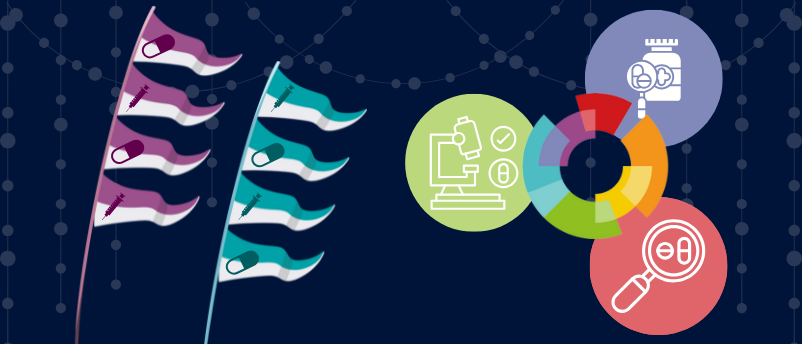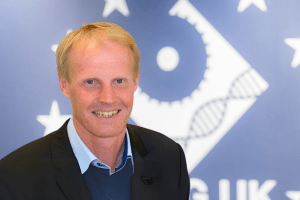Hosting a festival of life science: insights from the new Chair

 Recently dubbed the ‘Glastonbury of drug discovery’, the ELRIG (London, UK) event coming up in October promises to deliver cutting-edge scientific presentations, amazing networking opportunities and to foster a true sense of community amongst delegates and attendees. Drug Discovery 2025 will be held in Liverpool (UK) on 21–22 October; we caught up with the host – recently appointed Chair of ELRIG, Del Trezise (left) – to learn more about the event.
Recently dubbed the ‘Glastonbury of drug discovery’, the ELRIG (London, UK) event coming up in October promises to deliver cutting-edge scientific presentations, amazing networking opportunities and to foster a true sense of community amongst delegates and attendees. Drug Discovery 2025 will be held in Liverpool (UK) on 21–22 October; we caught up with the host – recently appointed Chair of ELRIG, Del Trezise (left) – to learn more about the event.
Del has volunteered with ELRIG, a not-for-profit organization that brings together individuals from all areas of the life sciences, since 2013. Alongside ELRIG, Del supports a range of private companies as a non-executive director and consultant in the cell and protein analyses space. His main part-time position is a strategy and technology scouting role at Sartorius (Göttingen, Germany).
In this interview, we learn more about Del’s experiences volunteering for ELRIG, what it means to be Chair of the organization and what we can expect from Drug Discovery 2025.
What have been the highlights of volunteering with ELRIG over the past 12 years?
I first got involved with ELRIG as an invited speaker at one of their earlier events, which was a brilliant opportunity for me to share my science and meet interesting people. From that very first meeting, I could see that the organization had a culture of fostering connections and celebrating good science. Attendees and speakers were from a wide range of backgrounds and career stages, in both academia and industry – I found this diversity a real eye-opener and stark contrast to many other conferences I had previously attended.
After this experience, ELRIG asked if I’d like to be more involved, so I agreed to organize a track session at one of their conferences. Later I became the Scientific Co-Director of Drug Discovery, ELRIG’s biggest annual event. One of my greatest highlights has been working on Drug Discovery and seeing its success. So much effort goes on behind the scenes, but once the event rolls around, the engaging conversations, excellent scientific presentations and feedback we receive make it all worthwhile. I remember feeling super proud that I was a part of organizing something that truly benefited the life science community. ELRIG has created an amazing network, and so many of my own professional opportunities have come from connections I’ve made and science I’ve been exposed to at our events. I want to help grow and share that experience with other professionals in the life sciences.
After the Scientific Co-Director role, I joined the board and founded the work group for early career professionals (ECPs). The work group created a range of dedicated activities for ECPs, including a ‘Learning zone’ at our events, which provides a space for flash poster presentations, facilitates networking opportunities and hosts a webinar series to support professional development. ECPs are a critical part of our community; they bring incredible science, fresh ideas and energy, which contribute greatly to ELRIG’s culture.
More recently, I was asked to build a work group for early innovation companies – this is another area close to my heart. Like the ECP work group, that initiative created specific content and opportunities geared towards start-up companies. Start-ups are the future of the sector, so it’s important that we create space for them to forge collaborations with others in the community.
Overall, we get amazing feedback from the life science community praising ELRIG’s transparent and welcoming events – this is something we are all very proud of.
What does being Chair entail?
Although I’ve been on the board for several years, and I've worked closely with the previous chair during a transition phase over the last 12 months, it’s a new (and exciting!) position for me.
Most importantly, the Chair works with the board to set the strategic direction of the organization and ensure we are aligning with our mission and values. We have several new board members who bring with them fresh ideas and perspectives and introduce new people to our network.
Ensuring financial resilience and sustainability is a key priority. The Chair plays a key role in fundraising and longer-term financial planning. We have a number of large biopharma corporate sponsors that we're hugely grateful for; they provide us not only with funding but also access to some of their facilities to run our events. There is a great opportunity to attract additional corporate sponsors as I feel we can make a compelling case as to the value that we're bringing to the community that they serve. I also support the CEO and operational team in building relations and creating value for our vendor community – without their support we would not be able to prosper.
Do you have any specific goals that you'd like to achieve as Chair?
Many people perceive ELRIG as a first-class science conference organizer in the UK, but I increasingly see us as a critical sector influencer. I would like ELRIG to be celebrated as a true champion of the sector, an organization pushing forward and actively seeking new opportunities to help the community work more effectively together. We’ll achieve this through the work we’re doing now as well as pushing new boundaries. I’d like to expand our scope to attract more early clinical researchers to our conferences to facilitate connections between early stage drug discovery and clinical scientists. Although these connections are already being made, I think we could do more to support them and showcase these other areas of research, such as causal biology, personalized medicine and big-data analysis.
Another goal I have for us is to expand geographically. We've hosted several successful events outside of the UK including central Europe and, most recently, Boston, Massachusetts (MA, USA). I’d like to continue this work to extend our influence and impact, creating partnerships with local organizations and audiences to further our mission of connecting life science professionals and sharing great science.
Finally, I know that the Chair is merely a temporary custodian of the organization – if by the end of my term I look back and see that ELRIG is in a stronger position, making greater sector impact and staying true to our mission and values, I’ll be very happy.
Which talks or events are you most looking forward to attending at Drug Discovery 2025?
The tagline for this year’s Drug Discovery conference is ‘a festival of life science’, and some days it really does feel like the Glastonbury of drug discovery. There is so much going on in parallel. There is something for everybody and sometimes that drives difficult decisions since you can't be in two places at once.
I’m particularly excited for the keynote presentations, not only because of our brilliant speakers, but also because it’s the time when the whole audience gets together in one room, creating a real sense of community. This year, we've got Professor Heather Pinkett from Northwestern University (IL, USA) speaking about her work on ATP-binding cassette (ABC) transporters – proteins that use ATP hydrolysis to transport substrates across cellular membranes – and their role in antimicrobial resistance. We’re also excited to have Dr Dafydd Owen from Pfizer (NY, USA) speaking about how his team discovered and developed PAXLOVID during the COVID-19 pandemic. Both presentations sound riveting, and I think they’ll be well received by the audience.
Another part of Drug Discovery that I’m looking forward to is networking. There's always a chance to re-connect with people you know and to meet somebody new. It helps that ELRIG has special areas for different interests, such as our career zone, tech zone, breakthrough zone, learning zone and consultants’ cafe.
Finally, I’m excited about the quality of science in our sessions. This year, we've partnered with Alzheimer's Research UK, the Royal Society of Chemistry, the British Pharmacological Society, the Protein Society and the Standards in Lab Automation Society to ensure our scientific content is of the highest standard.
More about Drug Discovery 2025
On the first day of the conference, attendees will have the opportunity to listen to presentations in a range of different topic areas, including: Advances in robotics and automation for the life sciences – in collaboration with the Society for Laboratory Automation and Screening; In vitro and in silico models for sustainable drug discovery; From bench to brain: hit-finding approaches in neurodegenerative disease therapeutics – in collaboration with Alzheimer’s Research UK; Chemical biology and ‘omics for small molecules – technologies, developments and learnings; What’s new in protein sciences in drug discovery – in collaboration with The Protein Society; and From sample to data to insight – how robotics and automation enables the science of discovery.
Although day one looks to be a tough act to follow, attendees can expect another round of action-packed tracks from day two: Accelerating delivery of patient benefit for all cancer patients – in collaboration with Cancer Research Horizons; From concept to clinic: accelerating the path to life-changing therapies; Sustainable drug development: how can we mitigate environmental impact; Chemistry and innovations in drug discovery – in collaboration with the Royal Society of Chemistry; Use of novel technologies to enable drug discovery and drug repurposing – in collaboration with the British Pharmacological Society; and Making the impossible possible: using artificial intelligence to tackle challenges in drug discovery.
For more information about the specific talks in each track, visit the conference site.
About Del
After finishing his pharmacology PhD and postdoc, Del went directly into the biopharma industry to work in early stage drug discovery. For 15 years, he learned first-hand of a wide range of experimental approaches and strategies for target validation, hit finding, lead optimization and progressing molecules to the clinic. More and more, he was drawn to the applications of innovative tools and technologies, and at the midpoint of his career, he took the opportunity to co-found the European arm of Essen Bioscience, a startup developing new techniques for live-cell analysis. He played a key role in developing the highly impactful IncuCyte platform, which was ultimately sold to Sartorius in 2017. Seeing this startup’s success from beginning to end was a career highlight for Del, encouraging his involvement in other small startups. “I have the privilege to work on behalf of a number of different-sized companies, which gives me an interesting perspective on the strengths and challenges of these companies, as well as the opportunities and contributions these companies provide the drug discovery ecosystem,” Del concluded.
The opinions expressed in this interview are those of the interviewee and do not necessarily reflect the views of BioTechniques or Taylor & Francis Group.
The post Hosting a festival of life science: insights from the new Chair appeared first on BioTechniques.